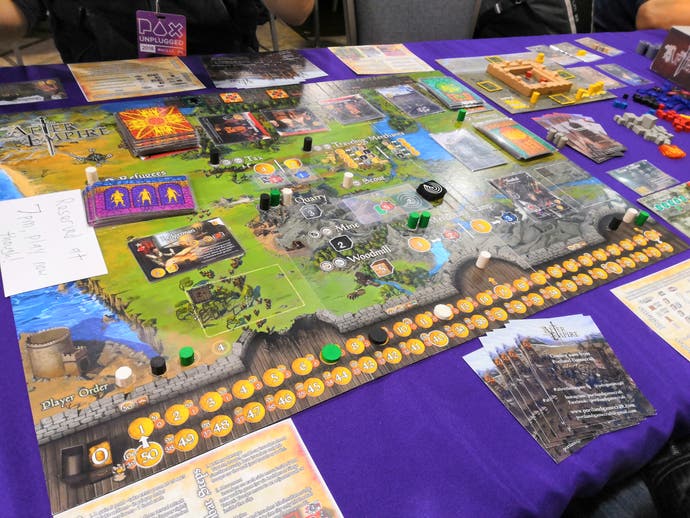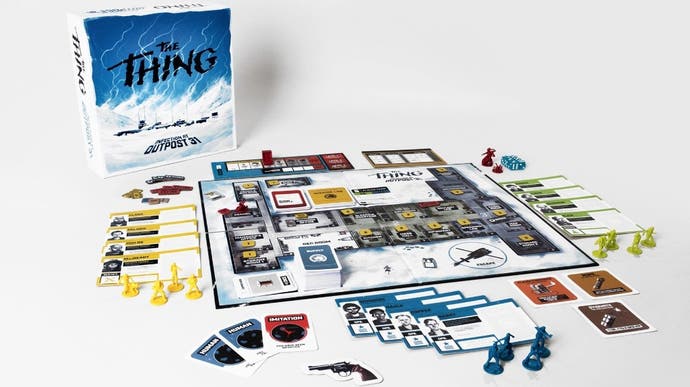The five best tabletop games I played at PAX Unplugged
Dice try.
Last week I attended PAX Unplugged (which is operated by our new owners, ReedPOP). It was my first ever board game convention, and I had a great time - they keep the lights on and you can hear yourself talk and everything. Crucially, I also played loads of tabletop games - here are the five best things I played.
Raccoon Tycoon
2-5 players, out in 2019. Pre-order from publisher
Raccoon Tycoon is a cutthroat game in which you, an entrepreneurial raccoon, manipulate the prices of various goods at market in order to make your fortune and buy more railways and towns than any other player.
With only five possible things to do on each turn it's a very quick game to pick up, but the vagaries of being an enterprising trash panda (and the overwhelming desire to hobble your opponents at any given opportunity) add a substantial tactical layer that made this my favourite game of the entire show.
For example, you manipulate the market by playing cards which both drive up the value of certain items and net you more of those commodities. Knowing when to push up the price of a particular good and when to crash it through the floor by selling up, thereby rendering your opponents' stock temporarily worthless, requires a keen eye. All of this is wrapped up in a gorgeous art style that really helps emphasise that while you are an entrepreneur with a near pathological need to grind your competitors into the dust, you are also an adorable raccoon.
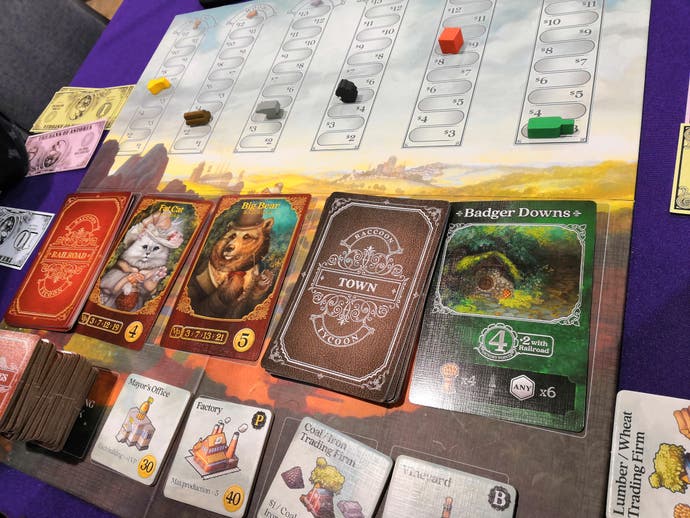
The Thing: Infection at Outpost 31
4-8 players, out now. Buy on Amazon
The Thing: Infection at Outpost 31 is, at heart, a social bluffing game. As players explore the facility from John Carpenter's iconic film, they'll never be entirely certain which one among them is secretly a terrible monster (unless they themselves have taken on that role). Everybody, of course, is going to be acting like one of the good guys, but the need to complete missions and proceed through the facility forces those players to cooperate even when they're certain that person is working against them.
It's similar to other games you might have played such as Avalon, The Resistance or Ultimate Werewolf, then, but the facility adds a welcome layer of strategy and misdirection (a bit like the Battlestar Galactica board game). Tabletop games don't always get it right when trying to represent a film or video game - often becoming a flimsy reskin or getting mired in complexity for the sake of one more reference - but The Thing strikes the balance between authenticity and fun cooperative experience just right.
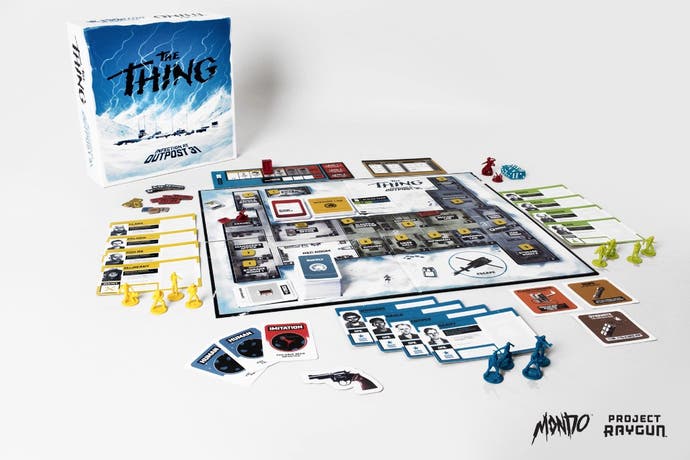
Scuttle
1-5 players, out now. Buy from publisher
Scuttle is a preposterously simple game about being a pirate, acquiring treasure and, of course, screwing over your rivals. On your turn you play a card from your hand either directly in front of you - where its treasure value contributes to your score - or into the middle of the table, whereupon the action written on the bottom of the card is resolved. This might be a lookout card that enables you to steal another player's treasure, for instance, or a spyglass that forces all opponents to play with their hands face up on the table until that card can be removed from play. The action is fast-paced and extremely silly but, crucially, it doesn't feel arbitrary like some other games (I am looking at you, Fluxx). Quick enough to not out-stay its welcome but fun enough for a series of just-one-more rounds, Scuttle has already taken a place alongside Coup and Codenames in my roster of easy games to bring to the pub.
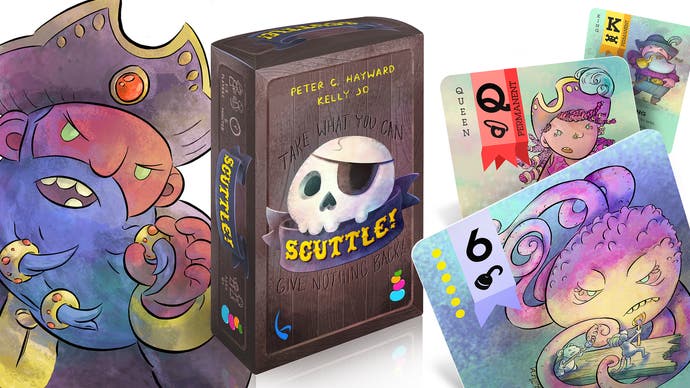
The Witcher RPG
2-7 players (ish), out now. Buy here
The Witcher seeks to bring Andrzej Sapkowski's dark, brooding fantasy world to the tabletop with all the monsters and weird sexual energy you might expect from the novels and video games. Having played it for four hours on the last day of Unplugged, I found it to be a fertile staging ground for the kind of grim tales of intrigue that so hooked me into The Witcher 3.
In short, our party sought to break a curse based on a small town that doomed all of its inhabitants - save the baron and his family, suspiciously - to dance endlessly until dead. I was playing as a sexy merchant with a dog and lots of muscles so, while I wasn't the most useful of characters, I nonetheless had a very good time. Mechanically, The Witcher takes some getting used to - while the system for rolling is simple to pick up, there are a lot of skills, abilities and incidental rules in play. It's a bit daunting for a first timer, in other words, but there's no denying that this is a very well thought out game - the authenticity that suffuses The Witcher makes for a really vivid and compelling experience.
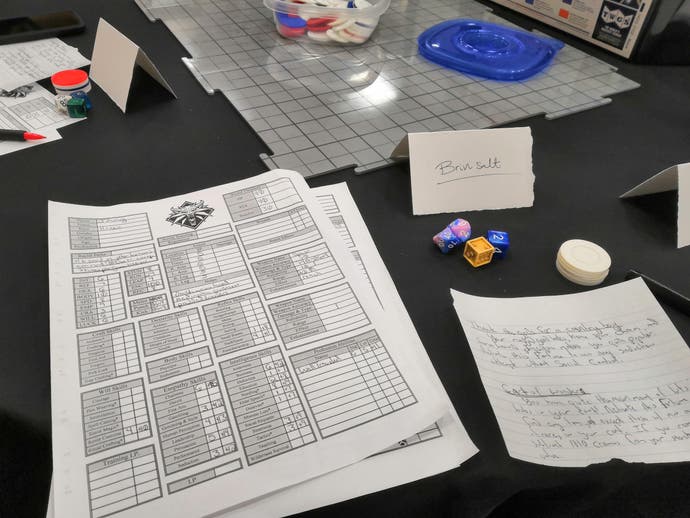
After The Empire
1-4 players, out in 2019. Not yet available
After The Empire is a worker placement game about carving out a fiefdom in a medieval kingdom after the fall of a great empire. It's currently in development (there's a kickstarter due to launch next year) but already it's shaping up to be pretty interesting. Half of the game's action is spent placing workers in order to generate resources, hire troops, construct and repair buildings and, crucially, prepare for invasion. The second half sees each player try to defend their keep from a series of marauders, but the crux is that you don't always know from which side the attackers will come, nor how numerous they will be. Making the wrong guess or failing to prepare adequately for the coming onslaught can see your castle get sacked, which will set you back both in victory points and in material costs to rebuild your ruined castle. While the assets weren't final, actually building up the castle using 3D printed walls and turrets was a lot of fun, helping visualise one's chances against the coming hordes at a glance.
After The Empire may not be redefining what a worker placement game is by any stretch of the imagination, but what it does differently it does very well. Certainly one to watch.
